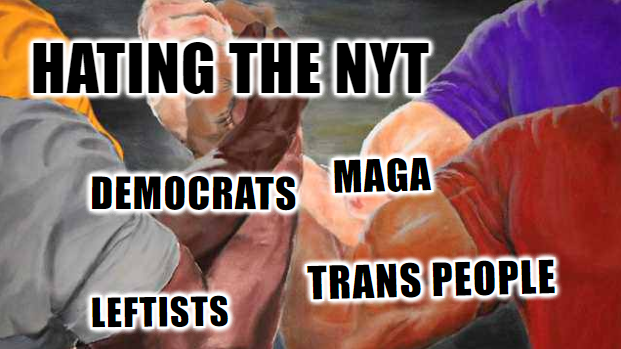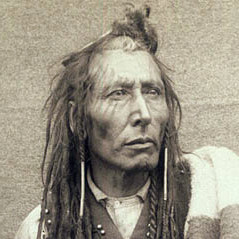Too little too late. Fuck the New York Times and their sane-washing of Trump.
Behind The Bastards did an interesting two part episode covering the role that the media played in Italy, Germany and the U.S. which contributed to the rise of fascism throughout Europe during the 1920s and 1930s. Basically, their attempts to maintain neutrality only served to legitimize extremist rhetoric and present fascists as reasonable folks who just had different, but equally valid, ideas. So The New York Times is just perpetuating the status quo here by sane-washing Trump and legitimizing the extremist goals of the MAGA movement. At some point everyone has to take a side, and many media outlets, including the NYT, have a lengthy track record of choosing to align themselves with the right side of history only after the dust has settled.
If anyone would like to check out the episodes I’m talking about, here’s the YouTube version:
Part 1: https://www.youtube.com/watch?v=URABscYOjRE
Part 2: https://www.youtube.com/watch?v=MW7FCJG9NjQ
Edit: Anyone suggesting the media should not reject fascism in the name of some misguided sense of objectivity will be ignored. I don’t debate the merits of legitimizing fascist movements.
I disagree completely with the part about news media should choose a side. That is exactly what they shouldn’t do. Report verifiable facts, without opinion. That’s the only way news media should be, in my opinion.
The problem is that treating all arguments as equal gives undue credance to fringe groups. Like when a climate denier gets equal air time to an actual climate scientist, its portrayed as giving both sides an equal hearing but in reality a representative interview would be more like 1 climate denier and 100 climate scientists.
The problem is that treating all arguments as equal gives undue credance to fringe groups.
You’re conflating objectivity with false balance. the person above said “Report verifiable facts, without opinion.” That can be done while avoiding false-balance, especially if one side does not align with the facts (as trump rarely does).
Even just “report[ing] verifiable facts” entails opinion in terms of deciding which facts are important to report. Everything has its own perspective; there’s no way around it.
Your argument implies some sort of authority in news reporting. My personal feeling is that this is precisely what is wrong with today’s news reporting (specifically in the United States). It is their job to communicate what occurred. That’s it. They should not assert some sort of authority to tell you how you should feel about it.
Quick example: “Prosecutors allege that the defendant robbed the liquor store. They cite a, b, and c as evidence.” “Defendant claims the police are framing him and have planted evidence.”
That isn’t treating both arguments as equal. It’s simply stating what occurred. You can verify that both things were said. It will never be perfect, of course, but I think they should adhere as closely to this as possible.
Edit: Meant to add that in my world the climate denier would have never been given air time, because it’s been verified false. I think we are somewhat pointing out the same problem from two different views.
Report verifiable facts, without opinion.
That is fundamentally impossible, because journalists at least have to use opinion to choose which facts are important to report. Consider these two articles, for example:
deleted by creator
The issue is, it’s not really possible to do that in many if not most cases. For example, suppose you’re a political reporter, and a politician makes a claim that happens to be objectively false. Do you merely report that the politician made that claim, or do you report that the politician made that claim and that it is false, or merely report that the politician made a false claim without repeating it verbatim? All of those things are only reporting verifiable facts in this scenario, but they all give different impressions as to the character of that politician.
The obvious answer one might take is to go with the second option, and say that one should just report all facts available to you and relevant to an issue, because choosing what truths to say and what not to say still presents a biased picture even if every statement you make is a true one. But this is not a solution, because you simply cannot and will not have room to say every true statement about something, and you have to decide which things are relevant and irrelevant and to what degree, and your personal biases will influence these decisions regardless of how much you try to avoid that, because there’s not a way to objectively measure relevance.
Further, you do not actually know what is objectively true. You might say that a politicians statement is verifiably correct or incorrectly, because you believe that to be the case- and be wrong about that. There’s a greater likelihood that you’ll scrutinize something said by someone you disagree with, and so you’ll unintentionally portray your favored candidate in a better light, just because you don’t have time to verify every single sentence (and for that matter, since you’re a reporter and not actually someone collecting and analyzing the raw data, you won’t generally be equipped to verify things yourself so much as ask someone who you believe is reliable, and who therefore probably agrees with you and shares your biases), and you’re more likely to check if something is true if you already suspect that it isn’t.
Perhaps then, to be safe, you might only report that the politician said “x”, and not comment on if it is true. Beyond the obvious issue of helping to spread lies even if you don’t technically yourself say that they are truths, just that the person that said them did so, you still don’t have room or time to repeat every single thing that politician says. If you report on the more absurd statements of one politician and the more reasonable statements of another (which it may be hard not to do subconsciously, because absurd positions that align with your own won’t seem as absurd to you and therefore not as important to inform people of), you once again create a biased narrative out of nothing but true statements.
Finally, even if you avoid all this, you still introduce bias by when and where you say things. Stories run on the front page are more likely to get seen and read. TV broadcasts made when people are awake and at home are more likely to be watched. YouTube videos that appeal to the site’s algorithm are more likely to be seen, etc.
It is simply impossible to run an actually unbiased new source. You cannot say the whole truth, because you neither know it all nor have room for it all nor have the capacity to give it all equal attention. And you cannot say nothing but the truth, assuming you say anything at all that is, because your knowledge and sources are not infallible. The best you can do is state your biases up front, to the best of your ability, so that people know what kind of perspective your reporting comes from.
I understand and appreciate your point. That is why I used the term verifiable facts. If you can verify that claim X is false, (such as Trump’s claim of a rigged election, which have repeatedly been verified to be false) then by all means, report it as such. That is not taking a side. That’s reporting. At least, that’s how I see it.
Allow me to throw this wrench in the works:
Facts without context mean very little, and there will always be some bias in deciding what context is presented.
How often are facts truly verifiable though in practice, especially for a reporter, rather than just deciding that a certain set of people are honest and know what they are doing and asking them for their thoughts and evidence, which is really just taking the side of those people? Like, consider science reporting (because its probably a best case scenario, where claims made are supposed to be statements of objective truth about what was observed that can be physically verified, as opposed to being full of emotions and values). If youre a reporter reporting on something some scientists at CERN or whatever are telling you they’ve found, its not like you as a reporter have access to the equipment they use, or the know how to use it or understand what the data it generates implies. You pretty much just have to take their word for it. You could choose to go ask some scientists in the same field at a different lab who have been replicating the experiments about it, but then youre still just trusting those scientists too, rather than truly “verifying” the original scientists claims in a way that doesnt require taking somebody’s side on the issue by trusting their word or the authenticity of the evidence that they present. Now, with the scientists this is usually good enough, they dont usually have a ton of incentive to lie, and when they do, their colleagues dont have a ton of incentive to help them with it, but with politics, theres a lot of incentive to lie, a lot of incentive to support people on the same side as you, and a lot of incentive to try to undermine those on the opposite side even when the first side wasnt lying, so that trust is a bit more tenuous.
This isnt to say that I think we should take Trump’s blatant lying about the election seriously or anything, but its not like reporters reporting on it can prove for sure that there cant have been some kind of vast all encompassing conspiracy against him, including the legal system and therefore any evidence brought up in the various court cases on the matter, they can just point to those myriad of court cases and conclude that the odds that it was all some kind of conspiracy must be so low that the idea is laughable and not worth considering. Which isnt technically actually verifying that it is false, so much as pointing out that it makes far less sense to take Trump’s side on that than the side claiming he’s a liar such as to be safe in taking the side of the latter.
It’s easy you listen to your corporate boss and lie in your articles to sway the public to defend your heinous neoliberal political views so that you can maintain the status quo and continue to have access to the corporate politicians you bribe with your lobbyists to do your bosses bidding, and you shut your mouth and don’t ask any follow up questions
unbiased reporting is impossible. another word for bias is perspective.
How blithely ironic.
The New York Times, a publication famously loved and trusted by his base. /s

Tbf, “centrists” read it.
been in plain sight for months and they just now see it? guess its better than never though the damage is done
*Years*
…Decades…in fact, I don’t think he ever wasn’t.
Look! New York Times suddenly
discoversacknowledges Trump’s extensive ‘cognitive decline’Ftfy
It takes one to know one
Could this be the or an October surprise? It is October, and a surprise it definitive is…
The news source of this post could not be identified. Please check the source yourself. Media Bias Fact Check | bot support







